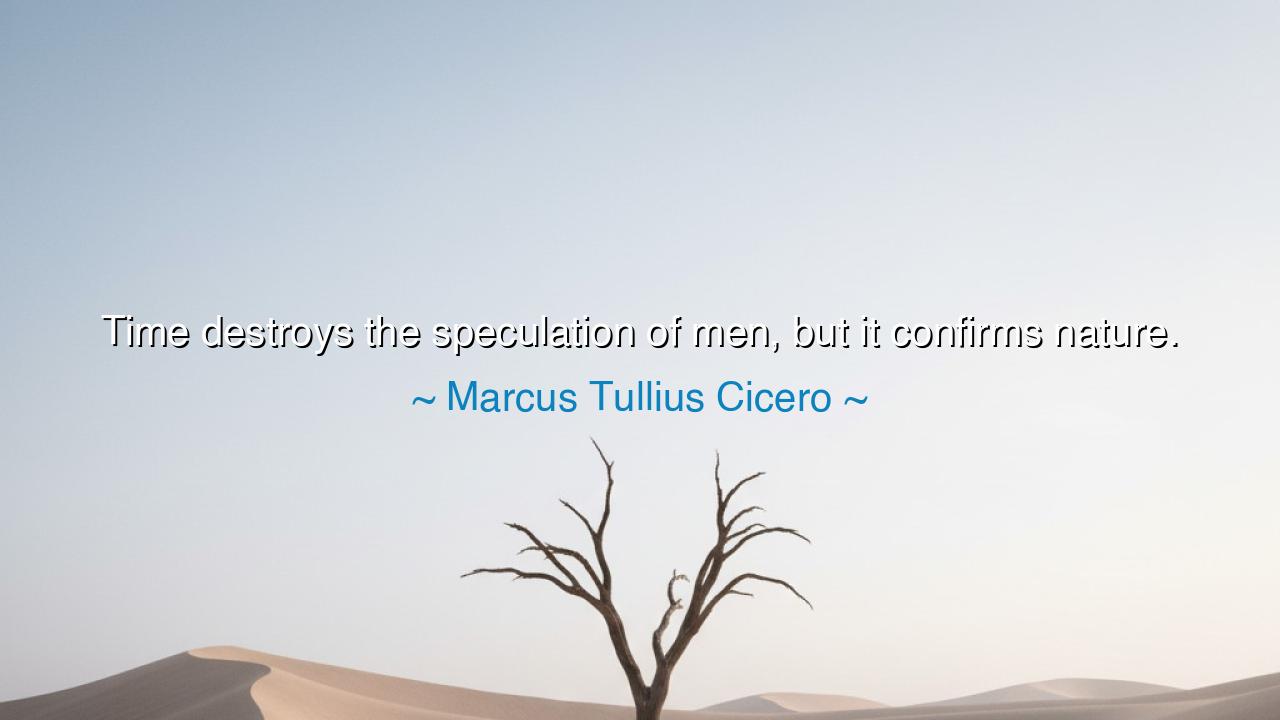
Time destroys the speculation of men, but it confirms nature.






The words of Marcus Tullius Cicero, “Time destroys the speculation of men, but it confirms nature,” stand as a monument of Roman wisdom, hewn from the philosopher’s deep reflection on the impermanence of human thought and the permanence of universal truth. Cicero, who lived in an age of turmoil when republics crumbled and ideals were tested, understood that the mind of man is restless, forever imagining, theorizing, and debating. Yet he also saw that time—the great revealer—has the power to dissolve illusion, strip away pretense, and prove what endures. In his words, he honors nature as the ultimate judge, the silent and eternal standard by which all human notions must be measured.
Cicero’s saying belongs to the ancient tradition of Stoic and natural philosophy, which sought harmony between human reason and the order of the cosmos. The ancients believed that nature is truth made visible—unchanging, self-sustaining, immune to the vanity of fashion or the pride of intellect. Human speculation, by contrast, is fleeting and fragile. It rises with pride and falls with error, each generation convinced that its theories are eternal, only for time to scatter them like dust. The Stoics taught that to live wisely, one must seek not what men invent, but what the universe reveals. Cicero’s reflection captures this spirit perfectly: all that is artificial fades, but what is real abides.
Consider how this truth unfolds through history. The astronomers of old once swore that the heavens revolved around the earth, and the philosophers built entire worlds of reasoning upon that falsehood. For centuries, their speculation ruled the minds of men—until time unveiled the truth through the lens of Copernicus and Galileo. The earth, it turned out, was not the center of creation, but a small companion of the sun. In that revelation, Cicero’s words were vindicated: the proud conjectures of man were broken, and nature confirmed her own laws. So it has ever been—the more time passes, the more illusions perish, and the more truth shines.
In a deeper sense, Cicero’s insight reaches beyond science into the realm of the soul. The “speculation of men” also includes the moral and political systems that societies build in their arrogance. Empires rise proclaiming their permanence, rulers declare their ideologies infallible, and philosophers construct fragile towers of theory. Yet time, impartial and relentless, destroys what is false in all of them. The Roman Empire itself—Cicero’s own world—stood as a testament to human pride, yet even it bowed before the unyielding rhythms of nature: the decay of power, the fall of ambition, the return of the earth to its quiet cycles. Nature needs no armies; her strength is patience.
There is a story that mirrors this truth in the life of Isaac Newton. At the height of his fame, he wrote, “I seem to have been only like a boy playing on the seashore, finding a smoother pebble or a prettier shell than ordinary, while the great ocean of truth lay all undiscovered before me.” Even the greatest of minds, humbled by the vastness of nature, understood what Cicero proclaimed: that human knowledge is temporary, but the order of creation eternal. Time does not destroy truth—it reveals it. What it destroys is only the arrogance that blinds men to its simplicity.
Yet there is no bitterness in Cicero’s words, only reverence. He reminds us that the passing of our ideas is not loss, but purification. Time is the friend of truth, for by sweeping away error, it brings the soul closer to wisdom. The wise man, therefore, does not fear the erosion of his theories, but welcomes it. He knows that what is truly natural—justice, virtue, compassion, and balance—cannot perish. Just as the seasons return, so too do the eternal principles of right and reason reemerge after every age of confusion. What is real needs no defense; it endures simply by being.
So let this teaching be passed down: seek that which time cannot destroy. Do not build your faith upon the speculations of men, for they change with the wind of every century. Instead, root your life in the enduring laws of nature—honesty, humility, and harmony with the world around you. When all theories fade, truth will remain. When all pride is humbled, wisdom will stand. For as Cicero teaches, time is not the enemy of man, but the servant of nature—and in the end, it is she, not we, who holds the final word.






AAdministratorAdministrator
Welcome, honored guests. Please leave a comment, we will respond soon